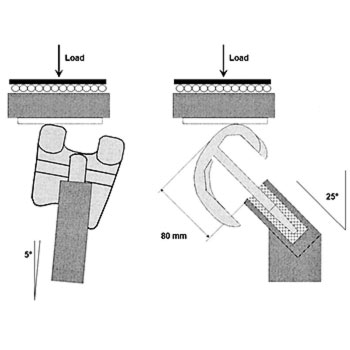Stemmed femoral knee component fatigue test - PI-53
Normative References
PI-53: Fatigue testing of stemmed femoral TKA components
The purpose of the test described in this internal test procedure is to determine the mechanical strength of stemmed femoral TKA components loaded under assumed worst case conditions.
The femoral component and the stem have to be assembled according to the customer´s instructions and tightened with a calibrated torque wrench (if required).
The load has to be applied at an angle of 25° to the neutral position of the femoral component as indicated by the client. This simulates a slightly flexed knee position. A varus malalignment has to be simulated by a 5° inclination of the specimen holder. This alignment leads to load only the medial condyle.
The suggested embedding level of the stem (if present) is 80 mm.
A load of 2,000 N (R=1/10) at a rate of ≤ 10 Hz is suggested to be used for the dynamic tests. Modular implants have to be tested in Ringer® solution at 37 °C.
The run-out criteria has to be set to 10,000,000 cycles.


